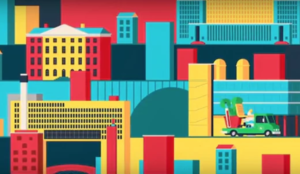The AUAS en UVA started a logistic hub, to realise sustainable and smart supply of 80 college buildings in Amsterdam. The AUAS and UvA have a tremendous amount of goods and services delivered. The two educational institutions, which have combined the purchasing of goods and services in a single purchasing organisation, deal with a total of around 16,000 suppliers.
Each year, all of those suppliers combined make 90,000 delivery trips amounting to a total of 2.8 million kilometres, which is equivalent to circling the earth 70 times. This enormous number of deliveries places a major burden on the environment, and adds to the hustle and bustle and traffic build-up and congestion in the city.
What is the result of the project?
This hub is aimed at suppliers of goods (some 8,000) who together make around 30,000 delivery trips per year, covering a distance of 1 million kilometres. The goal is to reduce the number of trips into the city over time, while simultaneously increasing the load in each vehicle. The hub will use clean, electrically powered vehicles and bicycles and should reduce the number of trips from 30,000 now to around 750 clean delivery trips per year in the future.
What can other cities learn from your project?
The use of a hub is one of the specific outcomes of a long-term study on improving the sustainability of purchasing by the UvA and the AUAS , conducted by AUAS researchers and students, which preceded the development of the hub. AUAS professor Walther Ploos van Amstel and researcher Susanne Balm have been working with suppliers since 2014 to identify the steps needed to make the traffic flows of the UvA and the AUAS more sustainable.
Combining deliveries in a hub outside the city was an important recommendation from the study. This has now been achieved in Duivendrecht in cooperation with logistics partners Deudekom (hub manager), PostNL (electric cargo bikes) and Transmission (electric trucks). The approach to the hub is what makes it unique. Whereas other logistics hubs are established using government subsidies, often from municipal authorities, this hub will run without any subsidy at all.
Same cost
Thanks to a smart redistribution of costs between the suppliers and the two educational institutions, the total costs will be no higher than they were previously. At the same time, both parties will benefit from lower fuel costs and less time lost by the suppliers, as well as more effective and cleaner deliveries for the AUAS and the UvA.
The hub has been achieved in Duivendrecht in cooperation with logistics partners Deudekom (hub manager), PostNL (electric cargo bikes) and Transmission (electric trucks). The first suppliers (Canon, Maas International, Heijmans, CWS and Staples) are already cooperating with the hub.
Source: Amsterdam Smart City.

